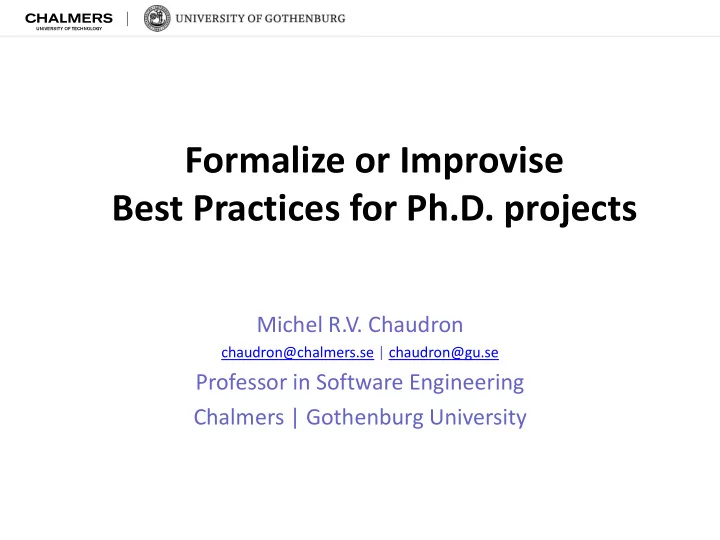

Formalize or Improvise Best Practices for Ph.D. projects Michel R.V. Chaudron chaudron@chalmers.se | chaudron@gu.se Professor in Software Engineering Chalmers | Gothenburg University
Software Engineering Division Staff Miroslaw Richard Jennifer Richard Robert Jan Michel Ivica Staron Torkar Horkoff Berntsson Feldt Bosch Chaudron Crnkovic Model-driven Software Variability Software Architecture and Software Software Engineering Product Lines Management Metrics Empirical of Software Industrial Thorsten Projects Patrizio Software Software Berger Collaboration Testing/QA Pelliccione Engineering Self-Adaptive Systems Software Security Open Source Systems Requirements Engineering Francisco Christian Oliveira Neto Berger Jan- Eric Philip Riccardo Regina Gul Agneta Philipp Knauss Leitner Scandariato Hebig Nilsson Calikli Steghöfer
My background PhD student (1992-1997) at Leiden University, Netherlands • – Spent 1 year in UK (Oxford and Imperial/London) Visiting Researcher in Melbourne (Austr), Lille (France) • Supervisor to 14 PhD students • TU Eindhoven & Leiden, Netherlands, Sweden External examiner (15 Ph.D. students) • Finland, France, Sweden, U.K, .. Currently: • – Managing 9 lecturers from Uganda as Ph.D. students in Sweden
Different Constellations • Topic wise: – Formal methods – Empirical SE – Start-up’s • Sandwich students – Industry – University – Uganda – Sweden • Part-Time student – Teaching at Polytechnic (3 days) and doing research (2 days) • Co-supervision – Uni-Spain – Uni-Netherlands – Uni-Australia – Uni-Sweden
Formalize or Improvise Netherlands Sweden • 4 year • 5 (4+1) year • 1 mandatory seminar/year • Mandatory 40-60 EC over 4 years • Only starts if 4 years of funding are available at • Mandatory: ‘examiner’: start of project person that performs QA on project – from day 1. • IT-system for monitoring progress • Yearly progress meeting
NL-BP: Common Training Schools • Universities in Netherlands share graduate schools around broad thematic areas – Programming & Algorithms, HPC & Imaging, AI & Knowledge systems • These schools organize one 3-day and one 5-day thematic training week each year + Pooling of resources + Exposure to other research groups / views on research area
Best Practices: Recruitment • Never ever do alone – also not if you are a very experienced professor • Invest time in top candidates – Ask them to perform representative tasks during interview visit (summarizing/writing, analyzing, presenting) • Pay attention to personality-match between candidate and supervisor – Esp. communication-match • Teach PhD students how to recruit!
Best Practices: Research Design • “Shoot for the stars” & Low hanging-fruit • Think: Portfolio, Risk and Return Return Goldmine Stellar Low Hanging Black hole Fruit Risk
SW-Best Practice: Examiner At the start of a project, the supervisor needs to • appoint an ‘examiner’ – an independent third party looking at the PhD-project. Ideally in same working-environment (informal chat at coffee-machine) The duties of this examiner are: - quality assurance - monitor progress - identify bottlenecks - benchmark against other supervisors - solve disputes - increases ‘transparency’
Social embedding of PhD students • Social Networking – In academic community - student volunteering at conferences - summer schools - in ‘office’ community research group • Senior PhD students mentor novice PhD students – In ‘local’ culture (housing, recreation, …) – ‘hanging-in there’ / mobilizing social-support – Dealing with supervisors
Training / Personal Development • Ph.D. student – Look at needs of individual • Technical or soft-skills • Networking • Supervisor – “Get feedback early and often” – but from whom? – organize ‘intervision’? – select your own training/mentor
Best Practice • Ph.D. examination: – Have both public and closed examination – Public examination is always more ‘polite’ / can be short – Feedback for supervisor from external examiner
Summary & Final Remarks • Wide range of constellations* require tailoring to needs *: background, duration, funding • Hardly ever ‘economies of scale’: numbers are too small • Best Practices: – Joint schools – Examiners – Organize feedback for supervisors • Post-PhD career-stage of Postdoc is harsh Can we do anything as a community/industry to improve this?
Ph.D. students supervised/in progress: Arif Nurwidyantoro (Joint with Prof. Jon Whittle, Monash Univ, Australia), started summer 2017, working topics: automated program understanding • & algorithmic bias. • Grace Bugembe (joint with Raymond Mugwanya and Regine Hebig), started 2016, working title: Characterization and Measurement of Capabilities and Processes of Software Start-ups in Emerging Ecosystems, expected completion: 2020. Rodi Jolak, started April 2015, working title: Understanding Software Design for Creating better Design Tools, Gothenborg Univ. • Truong Ho Quong, started March 2014, working topic: A study of UML practices in open source projects, Gothenborg Univ, • Dave Stikkolorum (part-time: started 2010-planned 2018), Didactics of teaching software design, Leiden University • Ana Fernandes Saez (joint with Marcela Genero, Ciudad Real; expected Q2 of 2018), Studying the effect of modelling in software Maintenance, Leiden • University Bilal Karasneh, An online corpus of UML Design Models: construction and empirical studies , 7 June 2016, Leiden, Netherlands • Hafeez Osman (Governement of Malaysia) , Interactive scalable condensation of reverse engineered UML class diagrams for software comprehension, • defence: March 2015, Leiden, Netherlands • Ramin Etemaadi (Omeca, SenterNovem), Quality-driven multi-objective optimization of software architecture design , defence: 11 Dec 2014, Leiden, Netherlands. Werner Heijstek (CapGemini funded), Architecture Design in Global and Model-centric Software Development, defence: 5 Dec 2012, Leiden, • Netherlands • Ariadi Nugroho (Finesse, LIACS), The Effects of UML modelling on the Quality of Software, defence 21 October 2010, Leiden, Netherlands • Egor Bondarev (TUE, Space4U, joint with Peter de With, Johan Lukkien); defence 22 december 2009 Design-Time Performance Analysis of Component-Based Real-Time Systems Christian Lange (TUE, Empanada); Assessing and Improving the Quality of Modeling, defence 24 October 2007, Eindhoven, Netherlands. • Giovanni Russello (TUE, SACC, joint with Maarten van Steen); Separation and adaptation of concerns in a shared data space , defence: 2001 - 27 June • 2006, Eindhoven, Netherlands Co-supervisor to: Mohamad Mousavi (TUE, SACC, joint with Michel Reniers), Ph.D. defence: 26 September 2005) • Evgeni Eskenazi (AIMES, with Dieter Hammer), defence: Fall 2004 • Alexandre Fioukov (AIMES, with Dieter Hammer), defence: Fall 2004 •
Recommend
More recommend